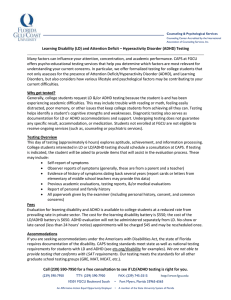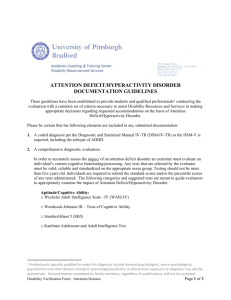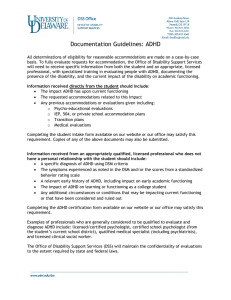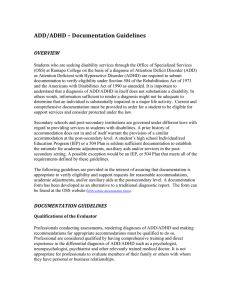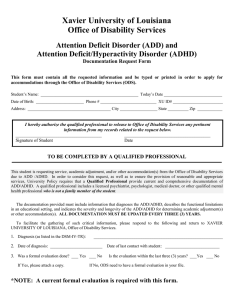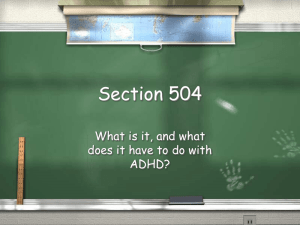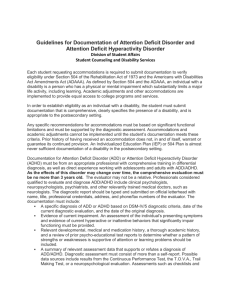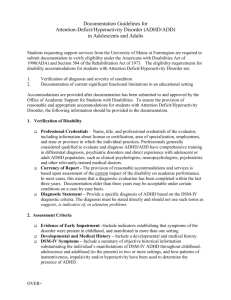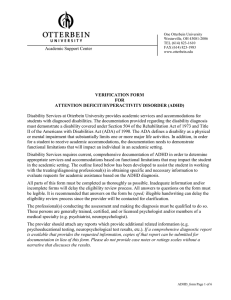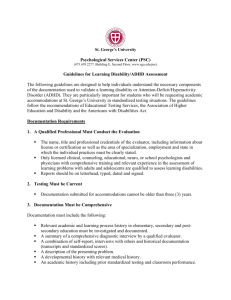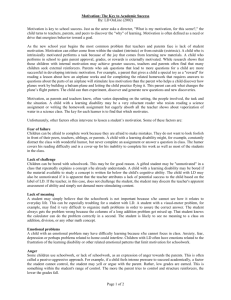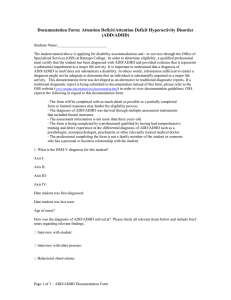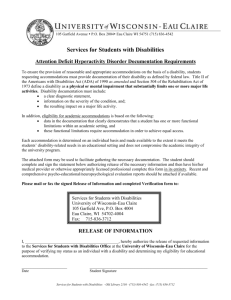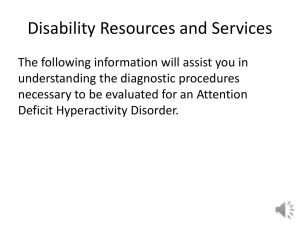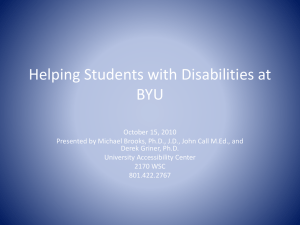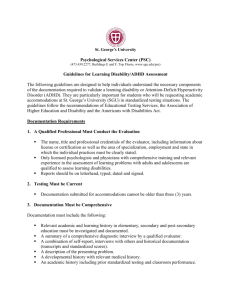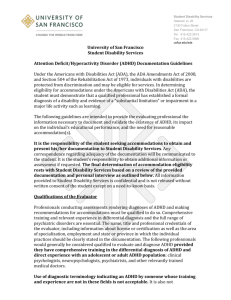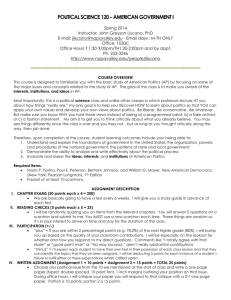ADD-ADHD Verification Form - Stevens Institute of Technology
advertisement
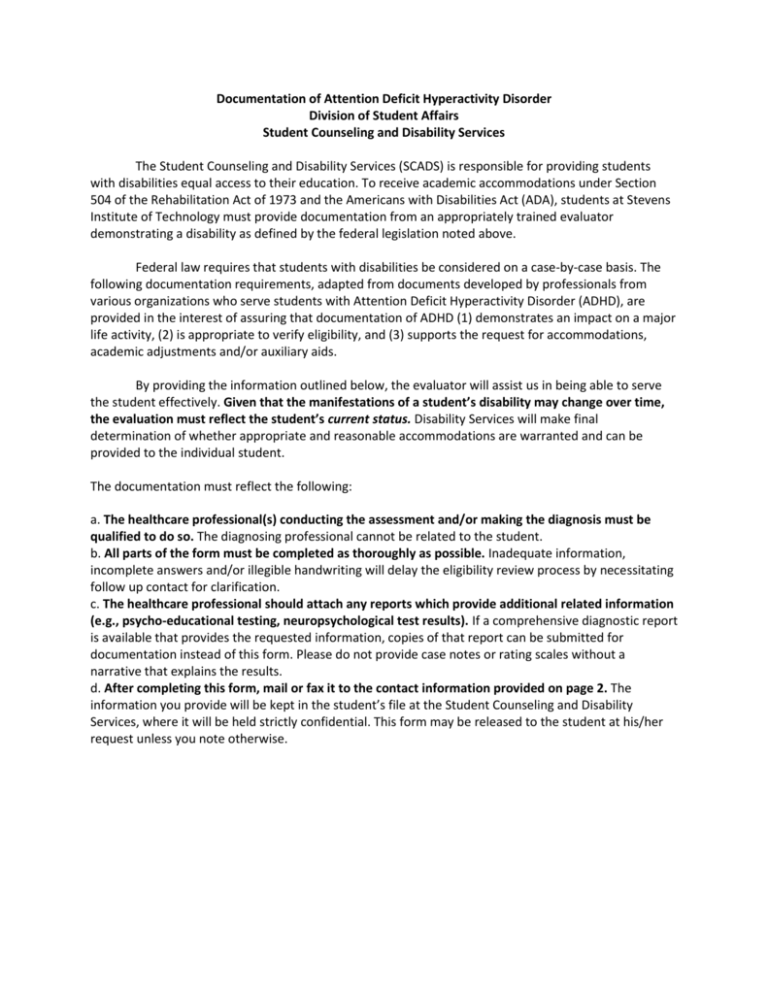
Documentation of Attention Deficit Hyperactivity Disorder Division of Student Affairs Student Counseling and Disability Services The Student Counseling and Disability Services (SCADS) is responsible for providing students with disabilities equal access to their education. To receive academic accommodations under Section 504 of the Rehabilitation Act of 1973 and the Americans with Disabilities Act (ADA), students at Stevens Institute of Technology must provide documentation from an appropriately trained evaluator demonstrating a disability as defined by the federal legislation noted above. Federal law requires that students with disabilities be considered on a case-by-case basis. The following documentation requirements, adapted from documents developed by professionals from various organizations who serve students with Attention Deficit Hyperactivity Disorder (ADHD), are provided in the interest of assuring that documentation of ADHD (1) demonstrates an impact on a major life activity, (2) is appropriate to verify eligibility, and (3) supports the request for accommodations, academic adjustments and/or auxiliary aids. By providing the information outlined below, the evaluator will assist us in being able to serve the student effectively. Given that the manifestations of a student’s disability may change over time, the evaluation must reflect the student’s current status. Disability Services will make final determination of whether appropriate and reasonable accommodations are warranted and can be provided to the individual student. The documentation must reflect the following: a. The healthcare professional(s) conducting the assessment and/or making the diagnosis must be qualified to do so. The diagnosing professional cannot be related to the student. b. All parts of the form must be completed as thoroughly as possible. Inadequate information, incomplete answers and/or illegible handwriting will delay the eligibility review process by necessitating follow up contact for clarification. c. The healthcare professional should attach any reports which provide additional related information (e.g., psycho-educational testing, neuropsychological test results). If a comprehensive diagnostic report is available that provides the requested information, copies of that report can be submitted for documentation instead of this form. Please do not provide case notes or rating scales without a narrative that explains the results. d. After completing this form, mail or fax it to the contact information provided on page 2. The information you provide will be kept in the student’s file at the Student Counseling and Disability Services, where it will be held strictly confidential. This form may be released to the student at his/her request unless you note otherwise. Date: _______________________ Patient Name: _____________________________________________ Birthdate: ___________ Last First M.I. 1. Date of first contact with this individual: ______________________________________ Date of last contact with this individual: ______________________________________ 2. DSM-5 diagnosis: 314.00 ADHD, Predominantly Inattentive 314.01 ADHD, Predominantly Hyperactive-Impulsive 314.01 ADHD, Combined Type 3. Level of severity: Mild Moderate Severe 4. How did you arrive at your diagnosis? Please check all that apply. Behavioral observations Developmental history Educational history Medical history Structured or unstructured clinical interview with the individual Interviews with other persons Rating Scales Neuropsychological testing (dates of testing) ________________________________ Other (please specify) __________________________________________________ 5. Functional Limitations: Please check the level of limitation you believe your patient experiences in the college environment as a result of his or her disability. Check only those boxes that apply. 0 = Not a problem 1 = Mild 2 = Moderate 3 = Severe _____ Caring for oneself _____ Talking _____ Hearing _____ Breathing _____ Seeing _____ Walking/Standing _____ Lifting/Carrying _____ Sitting _____ Performing Manual Tasks _____ Eating _____ Working _____ Interacting with Others _____ Sleeping 0 = Not a problem 1 = Mild 2 = Moderate 3 = Severe Learning Skills: _____ Reading _____ Writing _____ Spelling _____ Qualitative Reasoning _____ Math Calculating _____ Processing Speed _____ Memorizing _____ Concentrating _____ Listening _____ Other: ____________________________________________________ 6. Please check all ADHD symptoms listed in the Diagnostic and Statistical Manual of Mental Disorders, 5thed. Text that the student currently exhibits: Inattention: _____ often fails to give close attention to details or makes careless mistakes in schoolwork, work or other activities _____ often has difficulty sustaining attention in tasks or play activities _____ often does not seem to listen when spoken to directly _____ often does not follow through on instructions and details to finish schoolwork, chores, or duties in the workplace (not due to oppositional behavior or failure to understand instructions) _____ often has difficulty organizing tasks and activities _____ often avoids, dislikes, or is reluctant to engage in tasks (such as schoolwork or homework) that required sustained mental effort _____ often loses things necessary for task and activities (e.g., school assignments, pencils, books, tools, etc.) _____ is often easily distracted by extraneous stimuli _____ often forgetful in daily activities Hyperactivity: _____ often fidgets with hands or feet or squirms in seat _____ often leaves (or greatly feels the need to leave) seat in classroom or in other situations in which remaining seated is expected _____ often runs about or climbs excessively in situations in which it is inappropriate (in adolescents or adults, may be limited to subjective feelings of restlessness) _____ often has difficulty playing or engaging in leisure activities that are more sedate _____ is often “on the go” or often acts as if “driven by a motor” _____ often talks excessively Impulsivity: _____ often blurts our answers before questions have been completed _____ often has difficulty waiting turn _____ often interrupts or intrudes on others (e.g., butts into conversations or games) 7. Please describe any currently prescribed medications, including dosage, frequency of use; adverse side effects, and the effectiveness of the medication. 8. Are there other specific symptoms manifesting themselves at this time that might affect the student’s academic performance? 9. Please identify any other current psychological or physical disorder or condition you have diagnosed, or which you have on record for this individual: ___________________________________________________________________________ 10. State specific recommendations regarding academic accommodations for this student. Include a rationale as to why each accommodation is recommended and how the accommodation is relevant to this student’s functional limitations. In other words, why is the specific recommendation for this particular accommodation necessary for this student? Healthcare Provider Information Date: _______________________________________________________________________ Provider Name (Print): _________________________________________________________ Provider Signature: ____________________________________________________________ License or Certification #: ______________________________________________________ Address: _________________________________________________________________ _________________________________________________________________ _________________________________________________________________ Phone: _________________________________________________________________ FAX: _________________________________________________________________ Please Return To: Student Counseling and Disability Services Stevens Institute of Technology Castle Point on Hudson Howe Center 7th Floor Hoboken, NJ 07030 Form can also be faxed to (201) 216- 5629 or emailed to Lauren Poleyeff, Psy.M., LCSW at lpoleyef@stevens.edu
